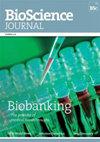The Bradyrhizobium uaiense strain UFLA 03-164T enhanced yield performance of cowpea in soils with low or high phosphorus content
IF 0.6
4区 农林科学
Q3 AGRICULTURE, MULTIDISCIPLINARY
引用次数: 0
Abstract
The objective of this study was to evaluate the agronomic efficiency of rhizobia strains already approved or in the selection stage for cowpea, in the Recôncavo da Bahia region, Brazil. Two field experiments were performed in the municipalities of Cruz das Almas and Maragogipe, Bahia, Brazil. A randomized block design was used with seven nitrogen sources and four replicates. Nitrogen sources consisted of the strains UFRB FA51B1, UFRB BA72C2-1, UFLA 03-164T, UFLA 03-84, INPA 03-11B, and two controls without inoculation, one with mineral nitrogen and another without. All the strains nodulated cowpea. The efficiency of the strains was determined by the number of nodules, nodule dry matter, total dry matter, grain yield, nitrogen accumulation in shoots and grain, and relative efficiency. The strain UFLA 03-164T can be recommended for biomass production, green manure, and promotion of grain yields in both soils. In Maragogipe, the UFLA 03-84 and INPA 03-11B strains can be recommended for biomass production, green manure, and promotion of grain yields. The UFLA 03-164T strain showed great potential to promote and grain yield in the two municipalities studied. The strain INPA 03-11B can be recommended for Maragogipe soil. UFLA 03-84 can also be recommended to increase grain yield in Cruz das Almas.缓生根瘤菌UFLA 03-164T在低磷和高磷土壤中提高了豇豆的产量
本研究的目的是评估巴西Recôncavo da Bahia地区已经批准或处于豇豆选择阶段的根瘤菌菌株的农艺效率。在巴西巴伊亚州的Cruz das Almas和Maragogipe市进行了两次实地实验。采用七个氮源和四个重复的随机区组设计。氮源由菌株UFRB FA51B1、UFRB BA72C2-1、UFLA 03-164T、UFLA 03.84、INPA 03-11B和两个未接种的对照组成,一个含有矿物氮,另一个没有。所有菌株都使豇豆结瘤。菌株的效率由根瘤数量、根瘤干物质、总干物质、籽粒产量、芽和籽粒中的氮积累以及相对效率决定。菌株UFLA 03-164T可用于两种土壤中的生物量生产、绿肥和提高粮食产量。在马拉戈吉普,可以推荐UFLA 03-84和INPA 03-11B菌株用于生物质生产、绿肥和提高粮食产量。UFLA 03-164T菌株在所研究的两个城市显示出巨大的增产潜力。可以推荐菌株INPA 03-11B用于Maragogipe土壤。UFLA 03-84也可用于提高Cruz das Almas的粮食产量。
本文章由计算机程序翻译,如有差异,请以英文原文为准。
求助全文
约1分钟内获得全文
求助全文
来源期刊

Bioscience Journal
Agricultural and Biological Sciences-General Agricultural and Biological Sciences
CiteScore
1.00
自引率
0.00%
发文量
90
审稿时长
48 weeks
期刊介绍:
The Bioscience Journal is an interdisciplinary electronic journal that publishes scientific articles in the areas of Agricultural Sciences, Biological Sciences and Health Sciences. Its mission is to disseminate new knowledge while contributing to the development of science in the country and in the world. The journal is published in a continuous flow, in English. The opinions and concepts expressed in the published articles are the sole responsibility of their authors.
 求助内容:
求助内容: 应助结果提醒方式:
应助结果提醒方式:


